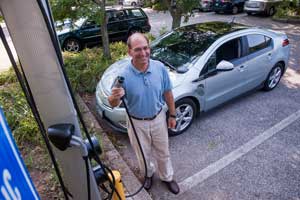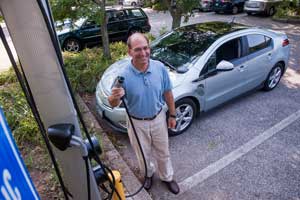 KINGSTON, R.I. – August 21, 2015 – The University of Rhode Island has signed the federal EV (electric vehicle) Everywhere Workplace Charging Challenge, which commits employers to install charging stations at their workplaces.
KINGSTON, R.I. – August 21, 2015 – The University of Rhode Island has signed the federal EV (electric vehicle) Everywhere Workplace Charging Challenge, which commits employers to install charging stations at their workplaces.
URI installed its first charging station for plug-in electric vehicles at the Mallon Center on East Alumni Avenue two years ago. URI is the first and only college in Rhode Island and one of the few workplaces in the state to sign the Workplace Charging Pledge. Because the charging station is used every day to capacity, the University is considering installation of a second station.
“This commitment is consistent with the University’s sustainability values and its leadership in environmental research and education,” said Christina Valentino, vice president for finance and administration. “The University is continuously taking steps to reduce its environmental impact and we see advanced technology as a key component of our efforts to reduce carbon emissions. All of our new and recent construction projects have included technology that lowers energy use. In addition, by having a charging station on the Kingston campus, we are making it more convenient for employees and students to choose sustainable transportation options.”
By signing the pledge to participate in the challenge, the University must develop a Partner Plan that details its workplace charging program and outlines goals and best practices for assessing and meeting employee demand. It must take action by installing charging stations and it must share progress on the plan with the campus community. The Office of Sustainability will oversee the Partner Plan.
Marsha Garcia, campus sustainability officer, said the electric vehicle charging station is one part of a comprehensive conservation and energy efficiency effort at the University.
“The Department of Energy has a national effort to encourage employers to have charging stations at their buildings for their employees who drive electric vehicles,” Garcia said. “Our charging station is publicly accessible, and there’s a time limit for charging, so if you’re driving through the state, you can stop and recharge your vehicle.”
Garcia added that the Office of Sustainability has worked in all areas of the University to promote energy and resource conservation, and she pointed to several successes.
“Our efforts to encourage use of mass transit has led to increasing numbers of people in the URI community riding Rhode Island Public Transit Authority buses, and installation of water bottle filling stations in three of our buildings kept more than 324,000 plastic water bottles out of the state’s landfill and recycling system,” Garcia said. “We’ve also installed the latest air handling systems and energy-efficient equipment in our new buildings to keep energy costs down. My office will continue to work with departments, groups and individuals across campus to make URI a leader in green policy and practice.”
President Barack Obama launched the Electric Vehicle Everywhere Grand Challenge in 2011 to prod U.S. companies to be the first in the world to produce plug-in electric vehicles that are as affordable as gasoline-powered cars by 2022. To help accomplish the goal, the U.S. Department of Energy established the Workplace Charging Challenge program to encourage employers to provide charging stations.
“The ability to charge at work can potentially double the portion of a plug-in electric driver’s commute that is fueled only by electricity,” the energy department said. “Additionally, as employees see their colleagues driving plug-in electric vehicles, the workplace can serve as a second showroom to increase consumer acceptance.”
According to the Department of Energy, employers who offer workplace charging stations can reap the following benefits:
• Installing workplace charging can be a sign of corporate/institutional leadership and innovation, demonstrating a willingness to adopt advanced technology.
• Providing charging stations can enhance an institution’s sustainability efforts, contribute to a building’s LEED (Leadership in Environmental Engineering and Design) certification and reduce emissions resulting from workers’ commutes.
• Workplace charging stations can serve as a valuable employee benefit by helping employees extend the electric driving range of their plug-in vehicles and thereby reducing their commuting costs.
Pictured Above
Gary Stoner, URI professor and director of the School Psychology Program and Chevy Volt owner, is a regular user of the university’s charging station conveniently located on campus. (Photo courtesy of URI Outreach Center)

